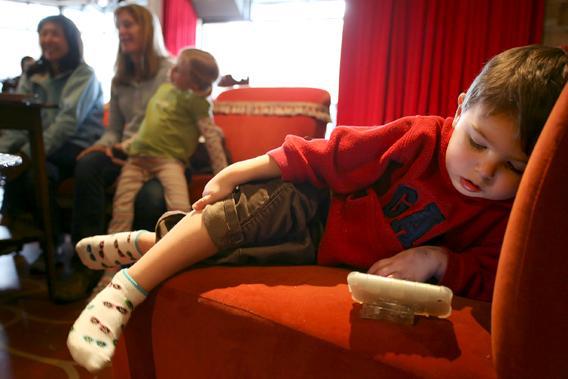The same group that targeted the Baby Einstein company for exaggerating claims that its videos would turn your baby into Albert Einstein has now moved on to Fisher-Price for its Laugh & Learn mobile apps. The group, called the Campaign for a Commercial-Free Childhood, filed a complaint to the Federal Trade Commission, saying that Fisher-Price does not have a “single credible scientific study” showing that babies can acquire any skills or information from these apps. CCFC probably chose to target these particular apps because a major toy company owns them and they are highly popular with parents. But I imagine if they could, the good people of CCFC would ask the FTC to investigate every one of the hundreds of thousands of app developers listed in the education category of iTunes, because its founders believe that these developers rob children of the right to grow up “without being undermined by commercial interests.”
CCFC similarly waited until the Walt Disney Company bought Baby Einstein in 2001 before filing a complaint against them. But with that franchise, the group had more of a legitimate claim about exaggerated marketing. Baby Einstein videos made very specific, direct claim that babies and toddlers would learn to identify shapes or colors or body parts, adding that there is a “little genius” inside your child, or that the child would have a “learning advantage” or test some specific percentage better on some particular measure of baby intelligence. These were the crude, early days of appealing to parental anxiety and ambition, and since then companies have gotten more subtle and smart. The iTunes page for Fisher-Price’s Laugh & Learn counting app says, for example, “Babies are encouraged to learn about numbers and animals through interaction with engaging animations and sound effects,” which, if you look at the app, they are. That doesn’t mean they will learn their numbers or morph into Isaac Newton, but, sure, encouraged they may be.
There are two ways to approach the strange new reality of electronic toy invasion of pristine babyhood. A parent can pretend it’s not happening and insist on a nostalgic vision of childhood dominated by bubble blowing and sand-castle building, or parents can make reasonable choices about, say, how many and which apps they will let their toddler play with and have reasonable expectations for results (that it will occupy your baby, not groom her for Harvard).
If you take the latter road, the Laugh & Learn apps are a perfectly reasonable choice. They meet the two criteria set out by Warren Buckleitner, founder of the Children’s Technology Review and expert on all things media for children: developmentally appropriate and interactive. The apps are based on the classic Fisher-Price Busy Box, a toy that’s been around at least since I was a kid. The concept is about as sophisticated as a rattle. In the real life version, you press, say, a purple star, and the Busy Box says “purple star.” In the app version, you touch a purple star and the same thing happens. The only difference on the app version is a baby can’t actually feel the bumpy star, but that’s not really a crime, is it?
News stories about this latest children’s media war repeat the same claims that CCFC made about Baby Einstein—that studies have shown that children under 2 who are exposed to media develop ADHD or score lower on certain tests or are more likely to develop some kind of delinquency later in life. But those studies are highly disputed, and there are many that show the opposite: that children can easily learn things if the media is designed correctly, as I outline in a recent Atlantic story on children and touch technology. CCFC is exaggerating when they say there are no credible scientific studies that show kids can learn from apps. There aren’t that many, because apps aren’t that old, but there is plenty of exciting research showing that apps, because they are interactive, are precisely the right kind of technology for kids.
In its Baby Einstein crusade, CCFC used to cite statistics showing that parents did not know that the educational claims were exaggerated. If that was ever actually true, it’s no longer. The generation of babies raised blindly on Baby Einstein videos is now in middle school, and we have had no reports of a prodigy boom. But if parents ever believed that a baby watching shapes drift by on a TV screen was going to turn into Einstein then they were willfully deluded. The cultural problem with kids and technology is deeper than false marketing claims. We American parents have a dysfunctional relationship with technology. We are terrified that too much of it will turn our kids into basement-dwelling losers but too little will mean they miss some opportunity at Silicon Valley greatness. We treat it like a precision instrument that we have to use in just the right way, instead of what it should be, which is a toy, a different way for kids to play.
